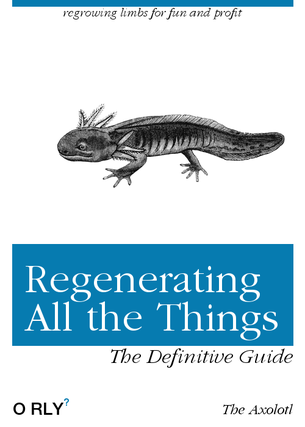Regeneration-related links
Development Journal Subject Collection - Model Systems for Regeneration
Dr. Amber Dance @ Knowable Magazine - Regeneration: The amphibian's opus
Some videos from the Currie Lab - Currie Lab Highlights on Youtube
Nature Methods "Creature Column" on the axolotl by Tatiana Sandoval-Guzmán of TU Dresden
Dr. Amber Dance @ Knowable Magazine - Regeneration: The amphibian's opus
Some videos from the Currie Lab - Currie Lab Highlights on Youtube
Nature Methods "Creature Column" on the axolotl by Tatiana Sandoval-Guzmán of TU Dresden
Mentoring, Equity, and Diversity in Science
Equity Reading list from Professor Needhi Bhalla at UCSC - Equity Reading List
Cell Press - 1,000 Inspiring Black Scientists in America
Cell Press - 1,000 Inspiring Black Scientists in America
Axolotl, salamander, and amphibian related links
|
Genomic and transcriptomic resources for the axolotl (Ambystoma mexicanum)
https://salamander-research.slack.com/home |
How to get a lab job
So, you’re an undergraduate student that’s looking for (more) research experience. Maybe you’ve heard that you “need it” or you are just excited about doing science in a lab. At first glance, it can seem nebulous and intimidating to craft an email to a professor asking for a research job. Here are some tips and advice for writing that email in a way that is sincere and more likely to warrant a response.
Some things NOT to do:
- Don’t start your email with “Yo,” ”Hey,” or “Hi (emoji).” Although most professors are fairly casual, first impressions do matter. Make a good one.
- Don’t write a “canned” email that is generic and impersonal. Take the time to learn about the research of the lab. In your email describe one aspect that you find fascinating and perhaps even ask a question.
- It’s not important to communicate in your email all the techniques or skills that you’ve acquired. Save that for your resume (which you should send as an attachment).
- Describe your motivations for doing research and your expected time commitment per week
- Briefly in one to two paragraphs describe the research questions that you have explored in the past (if applicable) and what you want to address in the future. This points to a mastery of scientific thinking rather than scientific technique, which is the true goal of your time in the lab.
- Suggest a face-to-face (or Skype) meeting and ask for a convenient time to talk.

